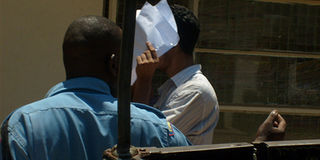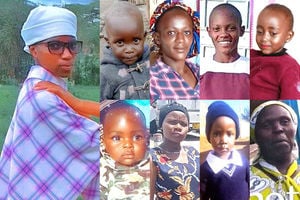Officials helping candidates cheat in KCSE exams

Photo/FILE
A man suspected of peddling KCSE papers at the Malindi Law Courts in 2008.
Some Form Four candidates have been secretly accessing examination questions of the ongoing tests before they are sat.
Unscrupulous officials release the questions to the Kenya Certificate of Secondary Education (KCSE) candidates as early as 5am, long before the start of the exams, usually at 8am, Nation investigations established.
It also emerged that impersonation was becoming another key method of cheating in the exams that are in the fourth week.
On Friday, Knec chief executive Paul Wasanga confirmed to reporters that some people were indeed sending purported details of exams for the day, early every morning as others circulated fake copies.
Mr Wasanga said 10 university students had been arrested for attempting to send exam questions on phone to candidates sitting the KCSE exams.
The students were from Kenyatta, Masinde Muliro and Moi universities, and according to Mr Wasanga, they were caught sending the texts at around 7am immediately after exam materials were opened at various stations across the country.
“We have allowed the candidates involved to complete the exams as investigations to the extent of their involvement gets under way,” Mr Wasanga said.
University students
However, for the university students arrested, “they will be charged in court for abetting cheating in national exams.”
Mr Wasanga’s statement came three days after the Nation, on Wednesday last week, found a set of hand-written material from a man who claimed they would be contained in the Christian Religious Education Paper II due that day.
The questions, he said, were leaked by an exam official charged with the distribution of examination papers. They ended up similar to those that were contained in the exam that day.
The man again turned up on the morning of Thursday with another hand-written set. This time, he claimed the questions were similar to those that would appear in the Agriculture paper two candidates would sit later that day.
The Nation deposited the hand written questions at the Central police station upon which deputy police boss Yawa Chome promised to investigate.
The questions, too, ended up being similar to those that appeared that day. When contacted that Thursday, Knec communications officer Fridah Were urged the public to ignore such questions.
She said the council suspected examination officials to be leaking the questions during the particular exam time.
“We can neither tell the authenticity of the materials nor from which area the said questions are coming from, until we know the people peddling them,” she said.
“It’s easier to prevent this vice if we got to know the source of the questions.”
Matter before police
However, she said they would not intervene in a matter already before the police.
In his interim report issued on Friday, Mr Wasanga said the examination papers were tampered with in parts of Nyanza in Ndhiwa and Kendu Bay as well as North Eastern in Moyale.
Although he didn’t explain whether any of the exam officials were involved in the tampering, he added that the Council and the police had already caught an administrator in the act of irregularity.
“The supervisor of the examination centre, colluded with the mother of the candidate who was being impersonated,” Mr Wasanga said.
In the same briefing, the council announced that some school heads were compromising supervisors by forcing them to allow candidates to refer to books, using impersonators to sit exams and allowing other people to answer the questions from elsewhere before answers are forwarded to the candidates in the exam rooms.
According to Knec, two teachers, a cook and 10 university students have been caught trying to cheat in exams for this year’s candidates.
Sixteen mobile phones have also been confiscated to stop candidates from receiving answers from “outsiders”.
While noting that taking mobile phones to an exam centre was an offence, Mr Wasanga said the cook had been suspended and the school board was conducting further investigations.
One person is already serving his term in jail. In another school, the principal worked out answers and passed them to the exam room for the candidates to copy, according to Mr Wasanga.
The exams council admits that cheating in exams is a global thing and requires more than just itself to curb the vice.
It is now emerging that exam cheats are happening at the centres and armouries where the materials are to be picked every morning.
Teachers, according to the council, have also been roped into the network and by use of mobile phones are receiving question purported to be the real, to work out answers and pass to their candidates.
The Section 15 of the Knec Act punishes those involved in illegally helping students, with up to a year in jail or Sh50,000 fine or both.
Last year, the council wanted to go further by cancelling results and banning cheats for two years before re-sitting the exam.
The number of irregularities came down from 1,711 cases in 2009 to 534 in 2010. However, the ban was later lifted.
Educationists now warn that punishing cheats would not be the ultimate solution to curb irregularities.
“Our school children are used to seeing politicians and senior officials going unpunished even after stealing public money. It only means that our society is used to cheating,” said Mr Isaiah Murungi, an education consultant in Nairobi.
According to him, the value attached to exams in the country is a key motivator to cheating because “people know that unless they pass, their life is no more”.
Mr Murungi thinks cheating will mostly come down through the recent co-operation between the National Anti-corruption Campaign Steering Committee and Knec, where the former will be conducting campaigns in schools and worship centres against cheating in exams.




